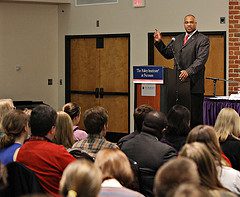Healthcare reform and what it means to you

JANUARY 19, 2012
by Chloe Kowalski ’12, Contributing Writer
Nine hundred and eighty-three billion dollars. That is the estimated overall cost of the Affordable Healthcare Act, but don’t panic. This act will not only pay for itself, but it will also save Americans money, at least according to Anton Gunn, Region Four Director in the Department of Health and Human Services.
On Tuesday night, Gunn, a native of South Carolina, spoke to a packed house of students and community members gathered in the Watkins Room. Brought by the Riley Institute, the former South Carolina representative said that his new position requires him to explain the nation’s new Affordable Healthcare Act to the Southeast region.
The region is often referred to as the top of everything bad, and the bottom of everything good, since it has the highest national rates of obesity, heart disease, and rural and elderly populations.
These statistics do not hinder Gunn’s faith in the new legislation.
“When God was handing out optimism, he gave me a double portion because I see Region Four as having the most opportunity for positive change,” Gunn asserted. “The Affordable Healthcare Act is the most transformative piece of legislation we’ve had in this country in the last 45 years, since the passage of Medicare.”
According to Gunn, the Affordable Healthcare Act recovers money by cracking down on fraud. Schemes of organized crime are able to steal millions of dollars a year from Medicare funds. To combat this problem, the act increases penalties and abilities to investigate fraud. Last year alone, after investing $35 million, $4 billion was recovered from fraud cases. The previous year, Gunn noted that more than $2 billion had been saved.
The crime-fighting side is exciting enough, but Gunn offered other arguments for the benefits of the healthcare plan. First, it expands coverage to people who don’t have any by lowering costs, eliminating pre-existing condition discrimination, and creating legislation to provide more access.
Second, the act makes healthcare more affordable by expanding coverage to pay for services that were once mostly out-of-pocket payments.
Third, Gunn said, the act improves quality by increasing communication and opening doors for hospitals to provide better care. Additionally, choices and information about those options will be more readily available and transparent.
Gunn also said that the new law will focus on prevention to promote our country’s overall health and wellness. Stopping problems before they start, he said, is the ultimate step in lowering costs.
“It’s not a perfect piece of legislation by any measure, but it does provide a good foundation to begin lowering costs, improving quality, providing more access, and providing better lifestyles of overall quality,” he said.